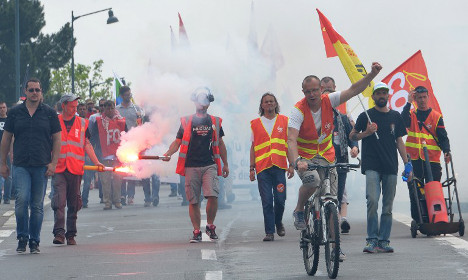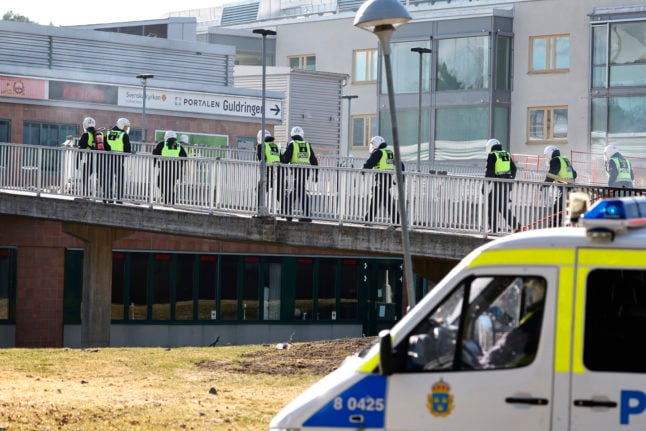Main points:
- Unions hope over a million people will turn out to protest
- Eiffel Tower in Paris closes as staff join strikes
- Taxi drivers also protesting by blockading roads
- French rail strike rumbles on into 14th day
- Paris march to take place between Place d'Italie and Invalides
With the Euro 2016 football tournament in full swing in France, hundreds of thousands of people are expected to take to the streets on Tuesday in new protests against the government's hotly contested labour reforms.
The latest in a wave of protests that began in March coincides with the start of debate in the French Senate over the reforms, which are aimed at making the job market more flexible but are seen by critics as too pro-business.
The Socialist government of President Francois Hollande hopes the latest day of protest, which will be centred in Paris with organisers sending bus loads of people in to the capital, will be a last stand for the anti-government movement.
#LoiTravail Le parcours de la #manifestation >> https://t.co/3oUr0tLY2U pic.twitter.com/6JbdxJcgGU
— Le Parisien Infog (@LeParisienInfog) June 14, 2016
But Philippe Martinez, secretary-general of the far-left CGT union that spearheaded last month's blockades of fuel depots and an ongoing rail strike, said: “The government says the movement is running out of steam, but tomorrow there's going to be a very strong mobilisation.”
Protests will take place in around 50 towns and cities across the country, but some 500 bus loads of protesters are scheduled to descend on the French capital.
On Tuesday the Eiffel Tower was forced to close all day as staff joined the protest movement.
Street protests against the labour reform kicked off on March 9th, culminating in massive demonstrations on March 31st that brought hundreds of thousands onto the streets.
With the Euro 2016 already shining the international spotlight on France, Tuesday's demonstrations will have a higher profile, especially if they descend into clashes between demonstrators and police, as several previous protests have.
Security forces are already stretched to maintain order at the football venues — failing dramatically in Marseille on Saturday when fan violence left 35 supporters injured, three seriously, in the worst violence at an international tournament in years.
Some 130 people who were arrested in previous labour demonstrations are banned from taking part in Tuesday's protests.
The tweet below, posted late on Tuesday morning, shows that police were already on the scene at Place d'Italie.
Le service d'ordre est mobilisé tt autour de la place d'Italie. Les manifestants st de + en + nombreux. #LoiTravail pic.twitter.com/boxyaMiasX
— France Bleu 107.1 (@FBleu1071) June 14, 2016
The opposition-dominated Senate on Monday opened debate on the contentious reform bill, which bypassed the lower house last month when the government used a constitutional tool to push it through without a vote.
The senators, who are expected to push for changes more favourable to employers, will wrap up their debate on June 24, with a vote set for four days later.
The unions have already called new protests for June 23rd and 28th.
If the two houses of parliament fail to agree on the legislation, the lower house will have the final say — and Prime Minister Manuel Valls could again ram the bill through.
While rejecting unions' demands to withdraw the bill, the government has watered it down, notably by scrapping a cap on severance pay.
President Hollande, who faces a re-election bid next April, had hoped for a signature reform to reverse his approval ratings, which are among the worst of a modern French leader.
Tourism hit
The reforms are aimed at reining in France's stubborn 10 percent unemployment rate by making it easier for employers to hire and fire workers, but detractors say it undermines job security.
The CGT has signalled that it may drop its demand for an outright withdrawal of the bill, instead pushing for the removal of a key clause allowing agreements that are negotiated between companies and their staff to take precedence over deals reached with unions in each industrial sector.
The union upped the ante last month with its oil depot blockades, which forced France to dip into its strategic reserves.
Adding to the climate of discontent, rail workers launched strike action earlier this month to protest working conditions.
They were joined at the weekend by a minority of Air France pilots.
The actions further depressed France's tourism sector, already hit by the November jihadist attacks in Paris.
Worse, from the Parisian standpoint, was a strike by rubbish collectors and incineration plant workers that left trash to pile up on the sidewalks last week.
The pilots' strike, which has affected only about one in five flights according to the airline, is set to end Tuesday.
The rolling strike at national rail company SNCF will mark its 14th day Tuesday with participation dwindling.



 Please whitelist us to continue reading.
Please whitelist us to continue reading.
Member comments